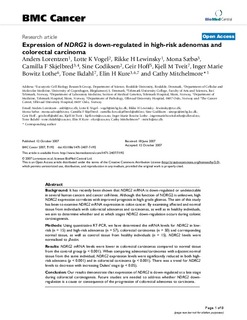Expression of NDRG2 is down-regulated in high-risk adenomas and colorectal carcinoma
Lorentzen, Anders; Vogel, Lotte K.; Lewinsky, Rikke H.; Sæbø, Mona; Skjelbred, Camilla Furu; Godiksen, Sine; Hoff, Geir; Lothe, Inger Marie Bowitz; Ikdahl, Tone; Kure, Elin H.; Mitchelmore, Cathy
Journal article, Peer reviewed
Published version
Permanent lenke
http://hdl.handle.net/11250/2439253Utgivelsesdato
2007-10-12Metadata
Vis full innførselSamlinger
Sammendrag
BACKGROUND: It has recently been shown that NDRG2 mRNA is down-regulated or undetectable in several human cancers and cancer cell-lines. Although the function of NDRG2 is unknown, high NDRG2 expression correlates with improved prognosis in high-grade gliomas. The aim of this study has been to examine NDRG2 mRNA expression in colon cancer. By examining affected and normal tissue from individuals with colorectal adenomas and carcinomas, as well as in healthy individuals, we aim to determine whether and at which stages NDRG2 down-regulation occurs during colonic carcinogenesis. METHODS: Using quantitative RT-PCR, we have determined the mRNA levels for NDRG2 in low-risk (n = 15) and high-risk adenomas (n = 57), colorectal carcinomas (n = 50) and corresponding normal tissue, as well as control tissue from healthy individuals (n = 15). NDRG2 levels were normalised to β-actin. RESULTS: NDRG2 mRNA levels were lower in colorectal carcinomas compared to normal tissue from the control group (p < 0.001). When comparing adenomas/carcinomas with adjacent normal tissue from the same individual, NDRG2 expression levels were significantly reduced in both high-risk adenoma (p < 0.001) and in colorectal carcinoma (p < 0.001). There was a trend for NDRG2 levels to decrease with increasing Dukes' stage (p < 0.05). CONCLUSION: Our results demonstrate that expression of NDRG2 is down-regulated at a late stage during colorectal carcinogensis. Future studies are needed to address whether NDRG2 down-regulation is a cause or consequence of the progression of colorectal adenomas to carcinoma.
